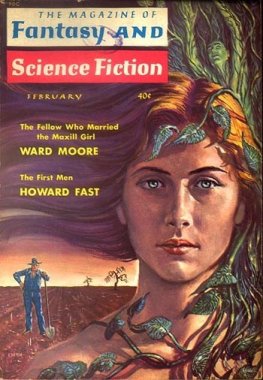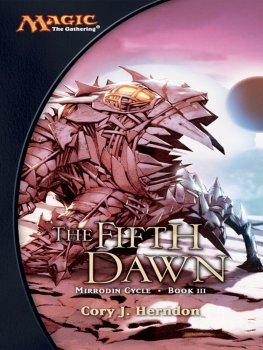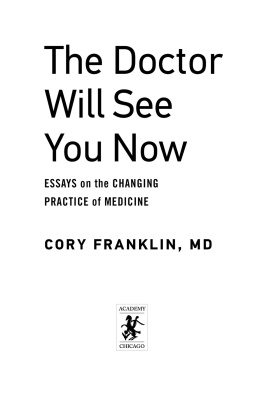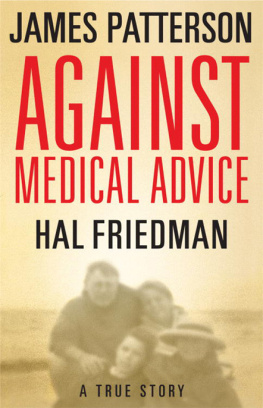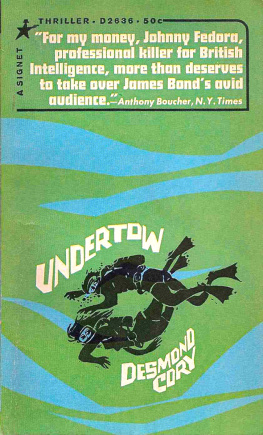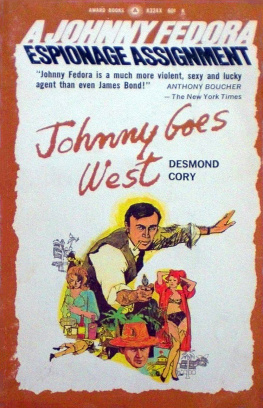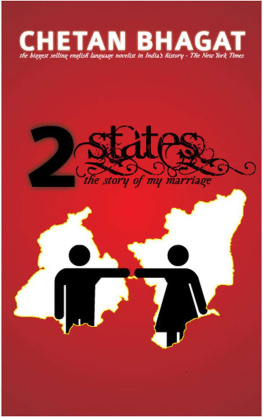Gleaming drops of water ran down the girls smooth back as Johnny ripped aside the shower curtain.
What do you mean, were married? he demanded.
The girl stopped soaping herself. Dont you remember? She sounded incredulous. Eight days ago, at the consulate. She shut the water off and stepped out of the tub.
Johnny stared. No, he wouldnt have forgotten her. But marriage? Ridiculous; he wouldnthe couldnttake on the responsibility of a wife.
The girl stood very close to him now. Her hands began to unbutton his shirt. The bed, she whispered, behind you. She laughed softly, her lips touching his ear. After all, were married...
A TIME BOMB SLOWLY TICKING AWAY...
THERE WERE FIVE MORE HOURS TO GOJohnny Fedora watched the needle stab his arm. Truth serum. Johnny felt calm, detached. He couldnt betray what he didnt know-could he?
FOUR HOURS TO GOThe phone gave a shrill ring. The Spanish official who ranked very near Franco spoke in his customary level tones. He was giving final instructions for his high-treason plan.
THREE HOURSThe girl was strapped to the complex electrical torture machine. She was totally nude. One flick of the switch and the white skin would turn coal black, the smell of burning flesh would fill the room.
TWOAll was quiet at Secret Service Headquarters in London. British Intelligence seemed strangely unaware of the imminent explosion that could blow the free world right off the map.
THERE WAS ONE HOUR LEFTTerror made Johnnys skin crawl. Three vital weeks were missing from his life hed suffered total amnesia just before the enemys horror plan began. But things kept hammering inside Johnnys head. What was Cell 11? Who was the sensuous beauty who kept insisting she was now his wife? Why did she lie about her bizarre pastthen make sure he found out the truth?
Johnny had to have answers.
AND THERE WAS ONE HOUR LEFT!
Intricate intrigue, vigorous
action, and a more provocative
girl than James Bond ever met
The New York Times
TIMELOCK
Desmond Cory
Originally published by Walker and Company,
a division of Publications Development Corporation.
Copyright 1967 by Desmond Cory
All rights reserved
Library of Congress Catalog Number: 67-23099
First printing 1968
AWARD BOOKS are published by
Universal Publishing and Distributing Corporation
235 East Forty-fifth Street, New York, N. Y. 10017
TANDEM BOOKS are published by
Universal-Tandem Publishing Company Ltd.
33 Beauchamp Place, London SW 3, England
Manufactured in the United States of America
1
A CUA , too, was driving to Barcelona. And he, too, was unconscious; or more precisely, asleep. His chauffeur had taken the no. 2 highway from Madrid and was, at the time of Fedoras sad collapse, nearing Zaragoza; he had just negotiated the rather awkward stretch that leads into La Almunia and was now, once more on the open plains, making up for lost time. From here on, he hoped to average a steady sixty kilometres or so an hour; he knew, in any case, that hed better. Acua was comfortably asleep m the back of the car, but at 5 a.m. on the dot hed be waking up, and when he did hed find himself in Barcelona. Or else....
Acua was a very important man. He was, among other things, chief security advisor to Munoz Grandes, who was Deputy Head of State to General Franco. That was his official post. He had a number of less official posts that the chauffeur knew about, posts guaranteeing him a yearly income of some five hundred thousand pesetas, but these posts somehow didnt get talked about muchcertainly not by the chauffeur, who knew the value of discretion. As for his private life, that didnt get talked about at all. It centred mostly on a flat off Recoletos where not one but two young ladies were together enabled to lead (as the chauffeur was convinced) the life of Riley, this in return for their doubtless highly skilled services from two to five p.m. daily. Daily. Acua was short and very, very fat and hideously ugly; he had to be, moreover, pushing sixty. Hence the chauffeurs discretion, it may be said, was tinged with a certain admiration. And when all was said and done, it . gave him something to think about on these long and boring night journeys. Food, so to speak, for the imagination. Acua usually slept. No wonder.
... But always woke at five. On the dot. The chauffeur glanced briefly at the clock on the dashboard and compressed his lips; the road, as they travelled eastwards, was getting greasier. But so far, they were making good time.
By 4.45, they were through San Feliu and the lights of Barcelona were a hazy glow in the sky to the north-east. Twelve minutes later Acua, on the back seat, stirred and then opened his eyes; he was awake. No yawning. No stretching. Hardly a movement. He was awake; that was all. The black car fled down the wide streets, the pavements to either side brushed orange by the overhead lights, shining wetly in the reflected beam of the headlamps. The air was damp. It made quite a change from Madrid.
Where are we? Acua asked.
He didnt mean, Barcelona. He knew that already. He wanted to know exactly. Going down Regencia, sir, towards the port. Well be at the Torre in about four minutes.
Acua grunted. After a while, he raised a hand to massage his unshaven chin. The tyres hissed on the road; the tall buildings drifted by. They passed a bicyclist, then two more; then a solitary taxi, going the other way. The car turned sharp left, ignoring the red admonition of a traffic light; Acua took out and lit a short thin cigar. In the Plaza de la Torre, the car came to a halt.
The chauffeur opened the door. Acua got out.
Ill phone you if I need you asrain today.
Yessir.
No case, no coat, no hat. Acua waddled towards the front door of the house that stood at the comer, not acknowledging the chauffeurs farewell salute. The door opened while he was still some ten paces distant from the front steps; a dark-suited figure showed briefly inside* silhouetted against the light that burned in the narrow hallway. Acua didnt nod to him, either. He walked unhesitantly in, and the door closed behind him. The chauffeur spat on to the pavement, clambered back into the Dodge and let in the clutch; the garage attendants at the Avenida would be on duty and waiting for him and so, with any luck, would be a cup of hot coffee. It hadnt been too bad a trip. Routine.
Anything from Recoletos? Acua asked.
No, sir. The man in the dark suit was trotting along at his heels like a well-trained gun dog. Nothing.''
Put me through.
En seguida, seor
Acua went through into the Divisional Coordinators office. A desk piled high with papers; a telephone. He sat down. The man in the dark suit picked up the telephone and commenced to dial. At Recoletos, theyd be waiting, too.
The fiat in Recoletos wasnt exactly what the chauffeur thought it was. It was the communications centre of the Spanish Secret Police; a very efficient organisation, in many ways. Acua thought so, anyway, and he was in a good enough position to judge. He was the head of it.
Wheres the Coordinator?
On operations, sir. He expects to be back before ten oclock. Youll find his memoranda, sir, on the desk.
Ugh, Acua said.
There was no shortage of papers on the desk. There was a whole mountain of them. Acua started to go through them. The Madrid call came through, almost at once, and he gave brief instructions without lifting his eyes from the folder open on the desk in front of him. When he had finished reading the folder, he laid it to one side and took another. Time went by. At irregular intervals, the man in the dark suit came in from the next-door office, earning new folders, messages, telegram slips and on one occasion an Interpol Blue. Acua took no notice. At ten oclock, he was still sitting there; the pile of papers had shrunk to perhaps a quarter of its former bulk. He went on reading, reading, reading. Nothing disturbed his concentration. This, after all, was his job; he was used to it. Papers, papers, papers.
Next page

